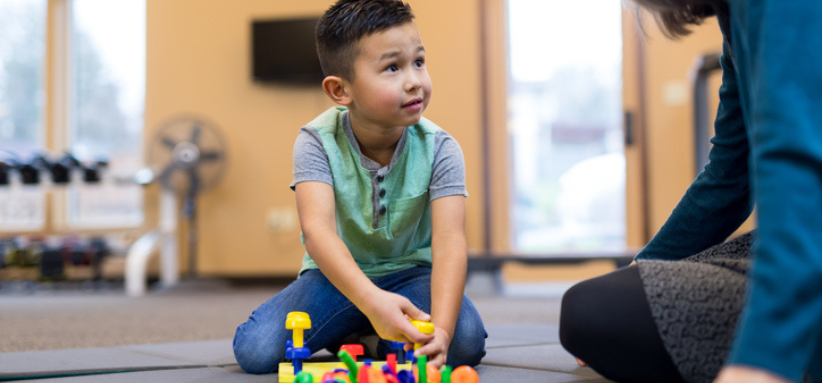Pediatric occupational therapy is a specialized field aimed at supporting children in their development and independence through targeted interventions. By working collaboratively with children, parents, and other professionals, occupational therapists help overcome challenges that may hinder daily, academic, and recreational activities. Discover how our services can transform challenges into opportunities for your child’s growth.

The Role of the Pediatric Occupational Therapist
The occupational therapist works directly with children by providing evaluation, stimulation, or intervention services. Their goal is to help children develop their skills and independence.
Occupational therapy focuses on occupational challenges, which are difficulties children may encounter in their daily activities:
- Personal care: cleanliness, hygiene, bathing, dressing, eating.
- Productivity: routines, homework, writing.
- Leisure: play, sports.
The occupational therapist may also collaborate with other professionals, educators, teachers, and parents through consultations, documentation, coaching, or training.
Types of Challenges That May Require Pediatric Occupational Therapy
In general, pediatric occupational therapy addresses the following situations:
- Difficulties acquiring independence in daily activities (dressing, eating, hygiene).
- Problems recognizing or copying shapes (learning letters in school).
- Various academic challenges (reading, writing, routines, transitions).
- Difficulties handling objects or using tools (scissors, pencils, utensils).
- Problems with motor coordination or clumsiness.
- Social difficulties.
If your preschool-aged child (4-5 years old) is experiencing difficulties with daily motor activities, consult our page on Pediatric Occupational Therapy – School Readiness for Ages 4-5.
Pediatric Occupational Therapy Evaluation
The occupational therapist assesses the child’s performance in completing daily living activities (DLA) and domestic activities (DA), considering multiple developmental areas:
- Motor skills: fine and gross motor skills.
- Sensory system: managing sensory stimuli.
- Perceptual-cognitive skills: interpreting visual information and using it.
- Socio-emotional skills: social interactions and socialization.
Benefits of Pediatric Occupational Therapy
Pediatric occupational therapy provides numerous benefits, including:
- Developing prerequisites for academic learning.
- Strengthening independence in various areas of activity.
- Improving self-esteem.
- Supporting emotional regulation, social interactions, and conflict resolution.
Pediatric Occupational Therapy Treatments
Pediatric occupational therapy employs a variety of interventions tailored to each child’s specific needs:
- Targeted play activities: to address daily challenges.
- Practical exercises: to promote independence.
- Parental guidance and strategies: to extend benefits at home.
Process of Care
- Initial Evaluation: A one-hour evaluation session is conducted with the child in a dedicated room. Before the session, parents fill out questionnaires to provide an overview of needs.
- Feedback with Parents: Results are shared to determine the need for follow-up and establish a personalized intervention plan.
- Intervention Session: The parent accompanies the child during play activities aimed at strengthening the child’s skills. Tools and strategies are also provided for home support.
Pediatric occupational therapy is a valuable ally in supporting your child’s development. By addressing each child’s unique challenges, our services aim to improve their quality of life while enhancing their self-esteem and independence. Book an appointment today to explore how we can contribute to your child’s well-being.
Pediatric occupational therapy expertises available
Pediatric occupational therapy – school readiness for ages 4-5
In some of our clinics, we currently offer an expertise for preschool-aged children (4-5 years old) facing difficulties in daily activities that require fine motor skills. Our experts focus on the physical aspects of these challenges, aiming to support young children in their motor development to ease their transition into kindergarten. Additionally, we can assist children already in kindergarten who are experiencing difficulties.


